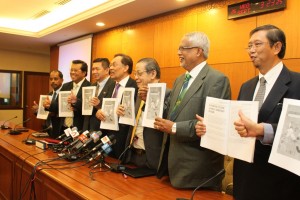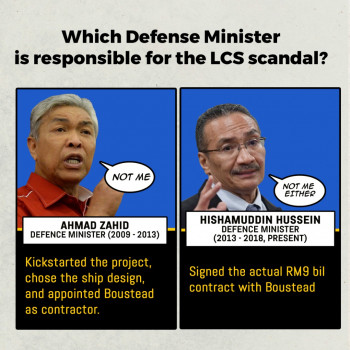by Liew Chin Tong
 Barisan Nasional paraded its “55 years” of track record” in “fulfillment of promises” – Janji Ditepati – during the Prime Minister Najib Razak’s recent roadshows and on National Day 2012.
Barisan Nasional paraded its “55 years” of track record” in “fulfillment of promises” – Janji Ditepati – during the Prime Minister Najib Razak’s recent roadshows and on National Day 2012.
One would expect a government with such a long experience in office would have long term strategies for the nation. Unfortunately, apart from arguing that i) change of government is not good for the economy and ii) that it is better to elect the known devils than the unknown angels, BN offers very little beyond the status quo.
BN’s economic platforms today can be summed up as follow:
1) Criticising Pakatan Rakyat’s economic policies as populist (while not offering concrete economic policies and strategies);
2) Offering more handouts to win the general election (which will cost billions of ringgit);
3) Preparing to introduce Goods and Services Tax (GST) after the general election to cover the cost of giving handouts now (and GST means every single person in Malaysia will be taxed).
BN’s polls-driven handouts and Pakatan’s care for the people
BN launched its polls-driven handouts, Bantuan Rakyat 1Malaysia (BR1M), in the 2012 Budget. It was actually a response to policy ideas mooted by Pakatan Rakyat.
Pakatan Rakyat announced in August 2011 that its Budget 2012 aimed at uplifting families with household monthly income of less than RM3,000. Deputy Prime Minister Muhyiddin Yassin replied that Pemandu was instructed to craft a response, which eventually becomes the RM500 per household aid.
In comparison, Pakatan Rakyat’s policies are well thought-out answers to the economic malaise faced by Malaysians.
The Malaysian economy is now serving the vested interests of a small group of cronies at the expense of ordinary Malaysians.
- 60% lives on a household income of not more than RM3,000 monthly; in fact, 40% are below RM1,500;
- Household debts is 77% of Gross Domestic Product (GDP); worse still, household debts is 140% to disposable income, second highest in Asia after Japan;
- 33% of workers earn an income of less than RM700 monthly.
Such dire situations require national attention. It is an impending crisis that has been swept under the carpet.
Economic policies must focus on improving the income and disposable income of the 60% at the bottom.
The basic idea is that when the ordinary folks have more cash in hand, they would not keep it in Swiss banks like the cronies; the lower income group would spend the cash in the economy, hence keeping the domestic economy afloat which in turn would benefit the businesses through multiplying effect from the expansion of aggregate demand.
It will be a rising tide that lifts all boats.
The global economic crisis has made it more urgent for Malaysia to focus on improving income and disposable income of its citizens. The most profitable economic activities of Malaysia and the rest of Asia for the most of the past four decades have been about exporting to the United States and Europe. Suppression of wages and currencies are typical policy tools to keep export cheap and competitive.
However, the advance nations are now faced with high unemployment rate which means diminished purchasing power.
What Pakatan will do for the people
 Malaysia and other Asian neighbours need to ensure that its citizens have enough money to consume their own products to sustain a vibrant economy.
Malaysia and other Asian neighbours need to ensure that its citizens have enough money to consume their own products to sustain a vibrant economy.
In the long run, huge income gap and a large section of the society being squeezed economically jeopardise cohesiveness and security of a society.
Hence, Pakatan Rakyat offers:
- A monthly minimum wage of RM1,100 (BN only announced the figure of RM900 a month but had yet to implement it);
- A commitment to reduce unskilled foreign workers who drive down wages and impede drive for automation;
- Through massive assistance to industries and businesses to encourage innovation, technological upgrade and automation to shift the economy away from its dependence on unskilled foreign labour;
- Through various policy measures to increase female labour participation from 46% to 60% within five years. A bi-salary family generally means a higher household income.
Most Malaysians, especially the lower income and middle class, have to fork out large portion of their incomes to pay for transportation, housing, education, health and security, due to poor delivery of public services or outmoded public policies. Addressing policy gaps in these areas will help improve disposable income of ordinary Malaysians.
Pakatan Rakyat proposes:
- Transportation – to reduce excise duties for car in order to cut car price hence reducing debt burden while improving the disposable income of ordinary Malaysians; to develop a multimodal public transport system which is based on bus and bus rapid transit (BRT) to reduce dependence on private vehicles.
- Housing – apart from taming speculation, new concepts such as social housing for the poor that do not require them to own a house, shared equity for middle class households and other measures would be introduced to ensure the availability of housing for those who need them, as well as reducing indebtedness.
- Education – free university education so that the youth are not burdened with huge debts before starting their careers.
- Health – to improve public health care services and to require government linked corporations not to own shares of private hospitals with the aim to narrow the gaps between public and private provision of healthcare.
- Security – to ensure the full commitments of the police to crime prevention.
Demolishing monopolies, cartels and oligopolies also play an important role in the effort to improve disposable income of the ordinary folks. Abolishing tolls in stages, removing control of cronies over paid television, rice, sugar etc, will contribute to better disposable income.
It is clear that Pakatan Rakyat offers a better life for all of us. BN has the opportunity to do something good for the country but its leaders have chose to protect only their family members and cronies.
Without offering new ideas and initiatives, BN can only offer cash handouts now. After the general election (which is within the next few months), each and every one of us will be forced to pay the BN government’s lavish spending through the GST and other forms of taxes.
Who will bankrupt the country?
BN has been attacking Pakatan Rakyat’s policies by claiming them to be mere populist measures without being fiscally responsible, and if implemented will bankrupt the nation.
Alas, typical propaganda from UMNO and BN leaders, as they are the ones who are controlling the media for many decades.
One of Pakatan’s key policy objectives is to see that Malaysian families live on a household income of more than RM4,000 a month at the end of PR’s first term as the federal government. The RM4,000 income a month objective is not an income guarantee or a minimum wage.
PR is reshaping our economy to one that shifts from BN’s obsession with race quota and distribution of wealth to a select few, to one that helps everyone at the bottom 60% regardless of race to live a dignified life.
How the people will suffer under BN: Beware of GST

BN has no solution to finance the ballooning national debts.
The BN Government claims that now “educating” the public on the impending implementation of Goods and Services Tax. It has also whispered to the financial market that the unpopular tax would be implemented in 2014. There are also talks about subsidy cuts which means higher fuel price.
Pakatan is not in favour of a higher fuel price until and unless public transport is adequate. The lack of decent public transport makes private vehicles almost a necessity.
Studies have shown that petrol price hike encouraged people to switch to motorcycle from cars, and, as a consequence, resulted in higher motorcycle deaths. Policy makers must be cognizant of the implications and impacts of their decisions on ordinary citizen.
Likewise, those who promoted the GST as the silver bullet to “get more people to pay tax” and solve the budget deficit are living in their own world. They said that there are too few Malaysians paying tax.
Certainly there are tax evaders and we have sufficient laws to deal with them. But the reason why the bulk of the population is not paying tax is because their income is too low to qualify to pay taxes.
Imposing a new tax on the lower income group is bad enough. A regressive, blanket tax like GST is going to hurt the bottom 60% badly. And with the bulk of the population having less disposable income, the rest of the economy would not do well either.
What must we do
BN should return to the root causes of high deficit – corruption and cronyism. In order to reduce the level of debts, the government must deal with corruption steadfastly. Unfortunately, UMNO and BN leaders are not interested in doing all these good things.
Why? Doing good for the people means putting aside their cronies. No, BN will never do that and has no intention of doing it.
The choice is getting clearer now. We voters of Malaysia have the power to decide what’s best for our family, our community and our nation. -The Rocket



